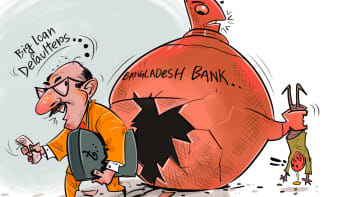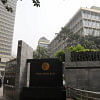Big budget, bigger corruption

In democracy, there are two types of accountability of the government: first, to the people who elect them, and second, to itself so that it can survive the wrath of public judgement.
This it does by knowing and monitoring whether it is fulfilling its election pledges and whether its own policies and projects are being implemented properly. This happens when the political forces it represents and the government institutions it runs work honestly, efficiently and for the public good. This is otherwise known as "governance," which can principally be assured by institutionalising "accountability."
This is where the present government has mostly failed, resulting in severely discrediting itself, crippling most institutions – through corruption and cronyism – and demoralising the youth by practising a culture of impunity.
Let's start with a small example of accountability failure – but one that is highly symbolic.
On November 28, the newly launched Dainik Bangla published a report titled "Taka thakley jail o mukto jiboner moto (If you have money, life in jail is as good as life outside)." The story details how bribery starts the moment one enters the four principal prisons in Bangladesh, and how money can ensure better accommodation, better diet, better living facilities including access to TV and a mobile phone – the latter often used for running illegal business, and even terrorist activities. While going for obligatory court appearances, arrangements can be made for a family visit. Like hotels, you can book hospital accommodation priced at Tk 10,000 for the first week, and half that amount for subsequent weeks. Yaba and other narcotics are also available. Officials know all this, but cannot or will not do anything about it.
Prisons are supposedly under full control of the authorities. If criminal activities cannot be controlled inside, how can the public trust the same authorities to control it outside?

A second example of accountability failure deals with delays in project implementation and the enormous cost escalation, with no one being questioned as to why. According to Jugantor of November 28, there was an additional cost of more than Tk 52,000 crore for 10 megaprojects caused by faulty designs, lack of proper feasibility study, additional work, lack of proper leadership and supervision, delay in release of funds, and other reasons. Not a single project was finished on schedule and the time extensions ranged from two to nine years, and still counting. Total funds allocated for these 10 projects amounted to Tk 63,757 crore. These are now estimated to cost Tk 116,198 crore.
A saying prevalent from the colonial days goes like this, "Sarkar ka maal, dariya mey dhal (If it is government money, it is okay to throw it in the sea)." Only now, instead of throwing it into the sea, we put it in our pockets. The Office of the Comptroller and Auditor General (CAG) may raise audit objections, but who has the time to look into them? And it does not pay to do so.
Here again, we raise the point of why no one has been held accountable for such an enormous waste of money. With Tk 52,000 crore, probably every nook and corner of Dhaka city's roads and its essential water supply could have been modernised. Not to be forgotten that the aforementioned amount is for only the 10 projects in question. Literally, there are a hundred others like them.
As for monitoring, there is a body called the Implementation, Monitoring and Evaluation Division (IMED) under the planning ministry. We occasionally hear about their reports, but without much impact as both time extension and cost escalation continue unabated.
Perhaps the most dangerous lapse of accountability is in the financial sector. This writer, in his column of November 17, drew attention to the rise of default loans from Tk 4,646 crore in 1990 to Tk 134,396 crore today – a growth of 29 times in nearly as many years. Here again, the truth is nothing has been done to remedy the situation except to pander to the culprits, which defies all logic and national interest. An exasperated High Court judge reprimanded, just a few days ago, an Anti-Corruption Commission (ACC) lawyer, saying, "Will the big loan defaulters remain untouched? They are misappropriating thousands of crores. The commission is busy catching small-time loan defaulters, but not the big ones."
News of the last few days dealing with loan disbursement of Tk 7,246 crore by the Islami Bank Bangladesh Ltd (IBBL) has shaken the financial sector and have raised serious questions about the monitoring and oversight role of the Bangladesh Bank (BB).
The IBBL disbursed Tk 7,246 crore this year to nine companies that were sister concerns of Rajshahi-based Nabil Group, of which Tk 2,460 crore were issued during 17 days of November. The bank officials told this newspaper that most of the companies gave fake addresses in their loan applications. How can that be? An address is one of the first things that banks check before considering any loan application – and that, too, one amounting to thousands of crores.
There are many more lapses that are unthinkable in the case of large loan disbursement. Either the IBBL staff have forgotten their trade, or its high-ups are more eager to loot it than to run it properly.
It must be mentioned here that the Islami Bank was once among the best banks run in the country. A few years back, it was suddenly taken over and a new board of directors, with a majority of new members and a new chair, was put in charge along with a new MD and some senior officials. How the changeover took place remains a mystery, but its effect is clear now. Surprisingly, the BB, which now monitors even the personal travels of bank MDs, did not take any serious note of this sudden and unexplained – to the public and especially to its depositors – takeover of the biggest private bank of the country.
What the accountability of BB or the finance ministry on this score is, remains a question.
The LC-related story of the Social Islami Bank Ltd (SIBL), which is currently making the rounds, is equally – if not more – horrendous if the BB investigation proves so. Sharpe Knitting and Dyeing Ltd has been using a bonded warehouse facility without exporting a single item. In the process, it has reportedly misappropriated about Tk 16,500 crore over a period of seven years.
Lack of accountability created the environment for this to happen.
At the very moment, banks have become burdened with so much mismanagement and loan defaults that the government amended the law to allow members of the same family to have a larger number of seats in banks' boards and for longer periods than before. This greatly increased family control of banks and weakened professional managers' power to enforce compliance and financial discipline.
Another nail in the accountability requirements.
Bigger budgets, bigger projects, bigger funding, bigger loans being defaulted, bigger corruption, bigger siphoning of project money, bigger amounts of laundered money, bigger houses in Malaysia and Canada, and lesser and lesser accountability.
A role model, indeed.
Post-script
This week, the finance minister asked the press, "How is the state of the banking sector bad? Let us know in writing and we will look into it." Obviously, he doesn't read the newspapers. Doesn't he have a huge staff to keep him informed? The minister does not know, so does it mean that his ministry does not know either? If they don't, then what are they doing, and do they deserve the salary and perks for which the public pay? If they do know, then why doesn't their minister know? There were numerous media reports recently on mega loans to dubious business houses. The Bangladesh Bank has initiated inquiries of its own on some loan disbursements by Sonali Bank Ltd, asking it to be stopped for now. The Parliamentary Committee on Estimates recently issued a report stating, "Sonali Bank's loan situation is frightening."
Yet, the finance minister knows nothing. His ignorance is highly irresponsible, extremely dangerous and totally unacceptable, especially at this critical time.
Mahfuz Anam is the editor and publisher of The Daily Star.

 For all latest news, follow The Daily Star's Google News channel.
For all latest news, follow The Daily Star's Google News channel. 










Comments